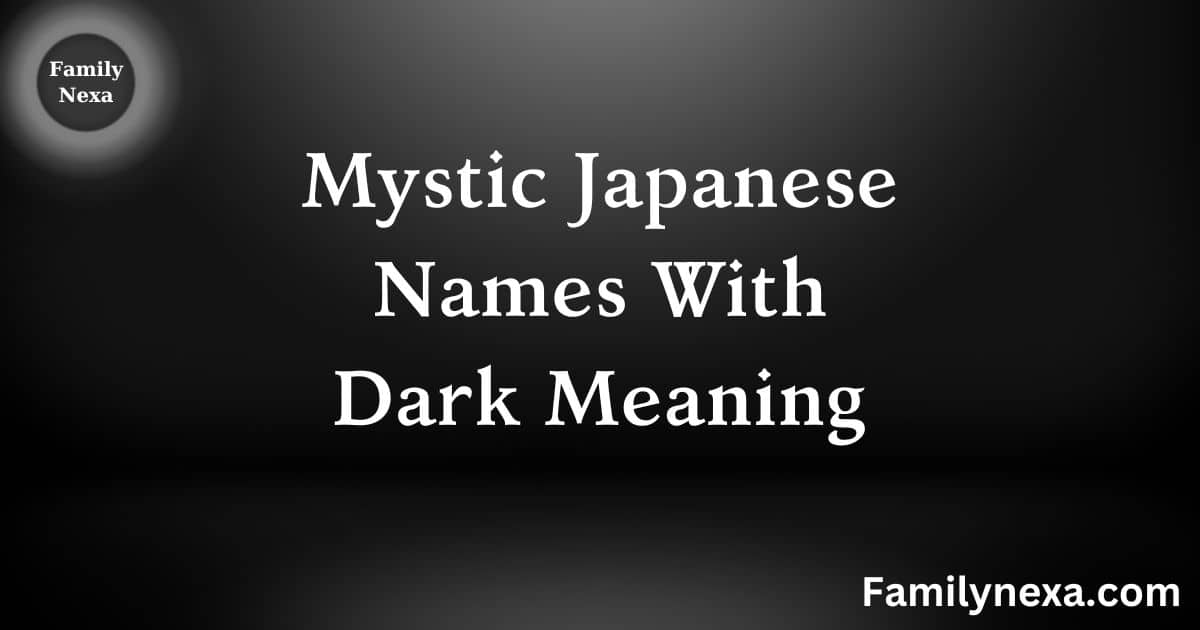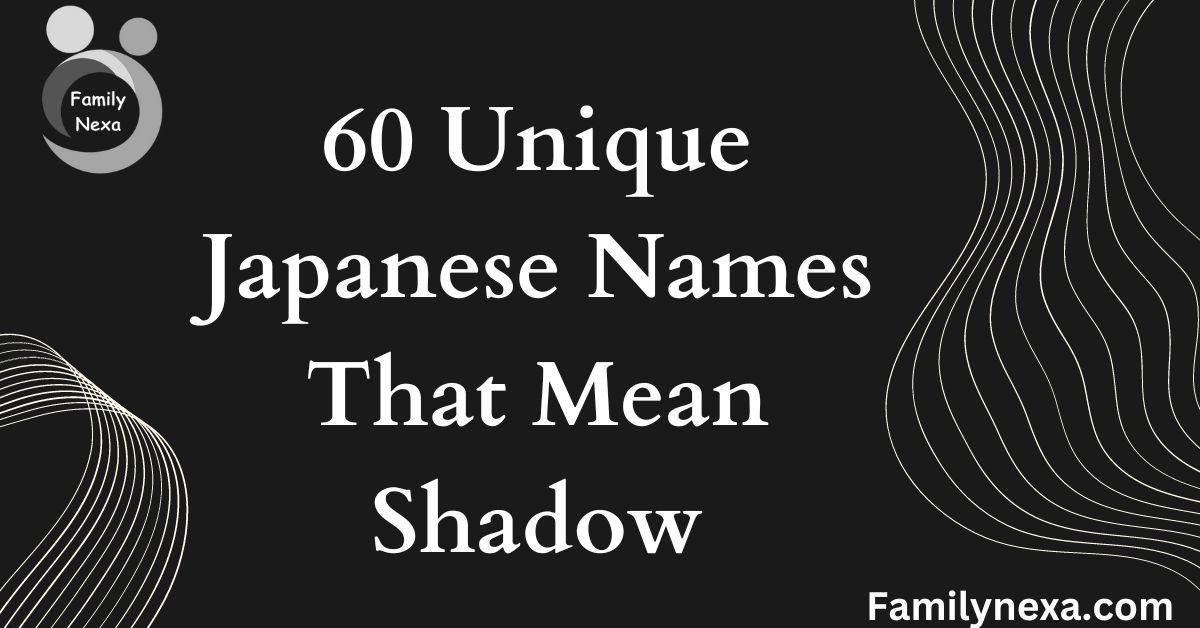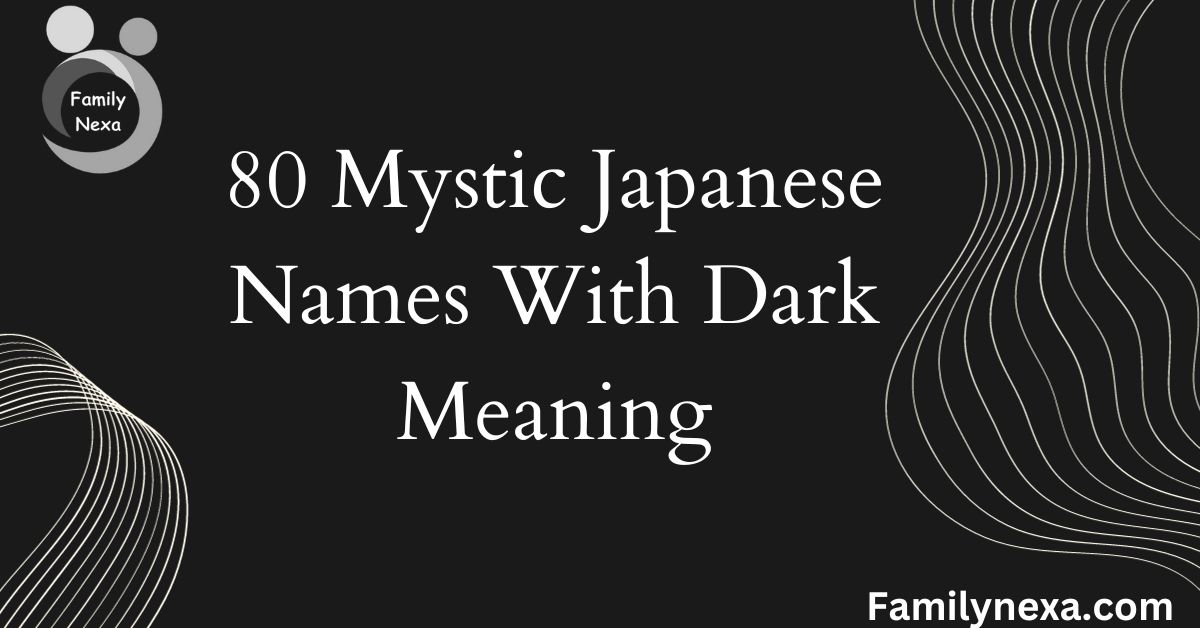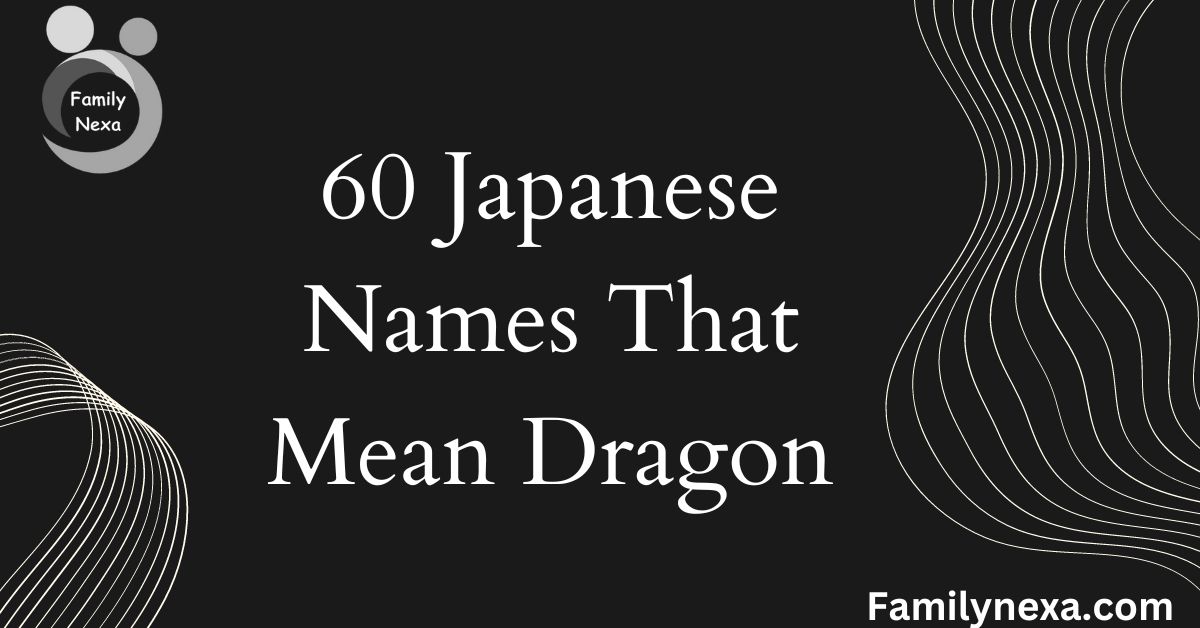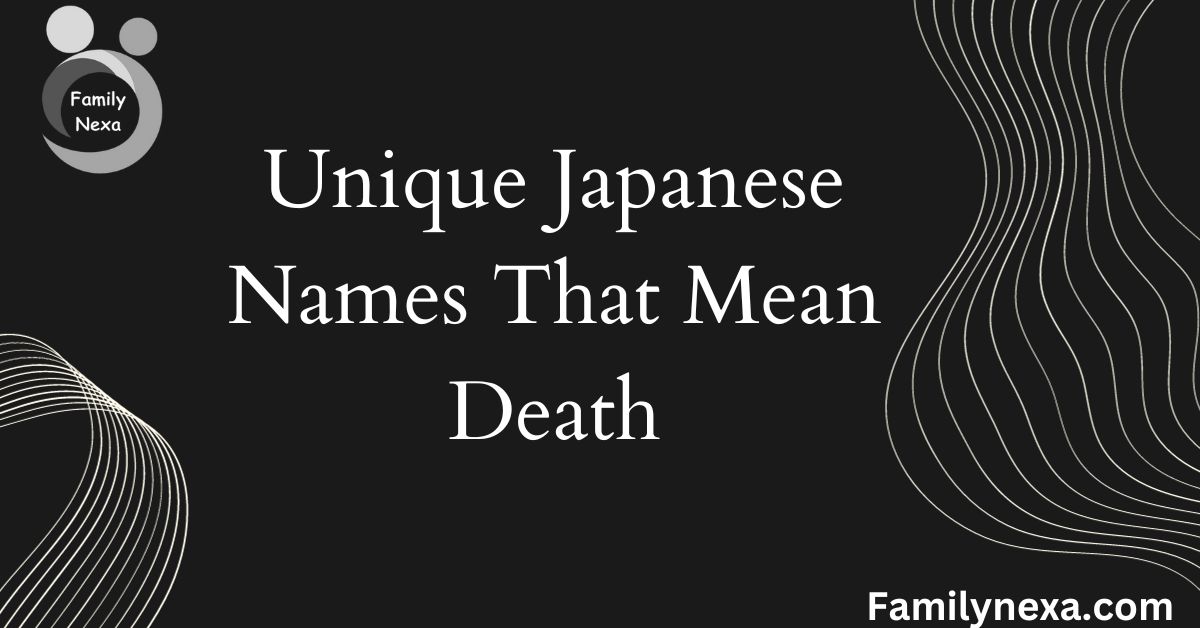Embrace the power of unconventional choices! Contrary to the common belief that names should only convey positivity, there’s a unique charm in selecting names with intriguing meanings. Take a step away from the ordinary and explore the depths of darkness, a symbol of strength, knowledge, mystery, and power.
Tailored for those who appreciate the enigmatic allure of the shadowed realm, we present a curated collection of names that could be the perfect fit for your new character, child, or even an alter ego. Break free from the conventional norms and discover the hidden potential behind names that defy expectations, opening doors to a world of strength and mystery.
23 Japanese Boy Names With Dark Meanings
Embarking on the intriguing journey into the realm of Japanese names unveils a rich collection of boy names imbued with mysterious and dark meanings. Here’s a selection to pique your interest:
1. Kuro
- Kanji: くろ
- Meaning: Black or ninth son.
- Pronunciation: Kur-oH
- Often evoking an air of mystery and darkness, this imposing name holds a certain allure.
2. Inkyo
- Kanji: いんきょ
- Meaning: Shadow
- Pronunciation: Een-kyoh
- Open to interpretation as the dark side of life, Inkyo intriguingly straddles the realms of negativity and positivity.
3. Kaiyo
- Kanji: 海洋
- Meaning: Darkness or ocean.
- Pronunciation: KAA-iy-Yow
- Viewed by the Japanese as the vastness of the ocean or the obscurity within the sea darkness.
4. Akuji
- Kanji: あくじ
- Meaning: Bad deed or evil.
- Pronunciation: Ah-koo-jee
- In Africa, Akuji conveys a deeper meaning of being dead yet awake, associated with attributes like bravery, courage, loyalty, and strength.
5. Akuma
- Kanji: あくま
- Meaning: Demon or devil.
- Pronunciation: Aku-MAH or A-koo-ma
- In Japanese Christianity, Akuma holds the weight of meaning Satan.
6. Boutoku
- Kanji: ぼうと
- Meaning: Cursed soul or blasphemy.
- Pronunciation: Bo-tok-oo
- Not only a name but also a character in Naruto Fanon, Boutoku adds an element of fiction to its dark connotations.
7. Inei
- Kanji: 胤裔
- Meaning: Shadow or dark.
- Pronunciation: Ae-ney
- Inei carries a sublime and sweet essence, often chosen to honor loved ones, symbolizing eternal love and devotion.
8. Kirai
- Kanji: きらい
- Meaning: Dislike or hate.
- Pronunciation: Kee-rah-ee
- A variant of the name Kira, Kirai reflects sentiments of disdain and animosity.
9. Kowai
- Kanji: こわい
- Meaning: Scary.
- Pronunciation: Koh-wah-ee
- A multi-layered name, Kowai also encompasses meanings of small, harmonious, and calm.
10. Kuragari
- Kanji: らがり
- Meaning: Darkness.
- Pronunciation: Kùrágárí
- Often used to symbolize danger, fear, and uncertainty, Kuragari paints a picture of the ominous and unknown.
11. Kurai
- Kanji: らい
- Meaning: Expressing a sense of gloominess or darkness.
- Pronunciation: Koo-ra-ee
- Kurai stands as a Japanese adjective, offering a unique and enigmatic choice for parents seeking a name with an exotic and mysterious touch.
12. Kuraim
- Kanji: 蔵真
- Meaning: Evoking a feeling of gloom and darkness.
- Pronunciation: Koo-ra-eem
- Internationally recognized and timeless, Kuraim holds popularity in Qatar.
13. Kurayami
- Kanji: らやみ
- Meaning: Symbolizing darkness.
- Pronunciation: Koo-ra-yah-mee
- This name finds fictional ties, notably in Bleach, where it denotes a God of death.
14. Kurashi
- Kanji: 暮し
- Meaning: Reflecting a sense of darkness.
- Pronunciation: Koo-ra-si
- Simultaneously conveying “fortunate,” Kurashi is often bestowed upon a family’s firstborn.
15. Kureru
- Kanji: 呉れる
- Meaning: Signifying the onset of darkness.
- Pronunciation: Koo-rah-roo
- Beyond its literal translation, Kureru holds positive connotations of generosity and kindness, also meaning “to give.”
16. Kuroshi
- Kanji: 黒潮
- Meaning: Describing darkness or blackness.
- Pronunciation: Koo-ro-shee
- With “kuro” denoting black and “shi” meaning death, Kuroshi transcends cultural boundaries and finds usage in various contexts globally.
17. Orochi
- Kanji: 大蛇
- Meaning: Representing a massive serpent.
- Pronunciation: Oh-ro-chee
- Orochi is famously associated with the eight-headed dragon in Japanese mythology.
18. Aku
- Kanji: あく
- Meaning: Conveying wickedness.
- Pronunciation: Ah-koo
- Aku is synonymous with evil.
19. Ashi
- Kanji: あし
- Meaning: Expressing the concept of evil.
- Pronunciation: Ah-shee
- Additionally signifying wickedness, Ashi carries a dual meaning.
20. Ebiru
- Kanji: エビル
- Meaning: Signifying evil.
- Pronunciation: Eh-bee-roo
- In other languages, such as Igbo, Ebiru takes on meanings like ‘desire’ or ‘dream,’ and in Yoruba, it often describes someone as ‘happy,’ ‘joyful,’ or ‘blessed.’
21. Fuzen
- Kanji: ふぜん
- Meaning: Representing sin, mischief, or evil.
- Pronunciation: Foo-zen
- While Fuzen suggests negative connotations, it also carries a positive reminder of the importance of forgiveness.
22. Taihen
- Kanji: 大変
- Meaning: Describing something awful.
- Pronunciation: Tay-hen
- Literally translating to “too much” or “excess,” Taihen portrays a sense of difficulty.
23. Nozomi
- Kanji: 望
- Meaning: Symbolizing hope, wish, or desire.
- Pronunciation: Noh-zoh-mee
- A beautiful and meaningful name, Nozomi represents optimism, hopeful dreams, and aspirations, making it an excellent choice for someone with a positive and forward-looking spirit.
It’s important to highlight that the intriguing significances of names have the potential to evolve based on the surrounding circumstances and how society uses them. A name could initially evoke thoughts of everlasting rest or delve into darker themes, yet it may also encompass extra layers of meaning, showcasing the profound complexity inherent in each name.
See also this Post: Japanese Names That Mean Moon
18 Japanese Girl Names With Dark Meaning
Similar to their male counterparts, Japanese girl names also carry intriguing dark meanings. However, beyond the initial impression of gloom, these names unveil captivating layers of cultural and personal significance.
In the rich tapestry of Japanese culture, these dark names serve as symbols of the unknown and the mystical, often intertwined with the realm of the afterlife. Far from mere labels, these names add complexity to their ornamental details, transforming them into more than just mere identifiers. Instead, they become narratives, weaving stories of supernatural beings taking on human form or embodying other enigmatic entities.
1. Ahma
- Kanji: あふま
- Meaning: Black rain.
- Pronunciation: A-Ma
- This name is perfect for girls born during the rainy months, from September to November.
2. Akuhei
- Kanji: 悪弊
- Meaning: Evil.
- Pronunciation: A-Ku-Ei
- Akuhei is a name associated with strength and power, making it a strong and impactful choice.
3. Kage
- Kanji: かげ
- Meaning: Shadow.
- Pronunciation: Ka-geh
- Naming your girl Kage is a great choice, especially if she was born at night. It’s also a popular Japanese surname.
4. Chiyo
- Kanji: 千
- Meaning: Bloody night.
- Pronunciation: kòhákú
- Chiyo holds various symbolic meanings, including prosperity, longevity, and inner strength.
5. Somberu
- Kanji: くすんだ
- Meaning: To be born in the evening.
- Pronunciation: Sohm-bey-ru
- This name is ideal for a baby girl born during twilight, capturing the essence of evening birth.
6. Youko
- Kanji:ようく
- Meaning: Night child.
- Pronunciation: Yoh-Koh
- Youko is a fitting choice for girls born under the moon’s light, adding a touch of mystique.
7. Ahmya
- Kanji: 天弥
- Meaning: Black rain.
- Pronunciation: Ah-MY-a
- Ahmya is a romantic name, perfect for a child born on a rainy day or when parents first met in the rain.
8. Amaya
- Kanji: 雨夜
- Meaning: Night rain or mother city.
- Pronunciation: A-ma-ya
- Another delightful name for a child born on a rainy day, featuring a pleasant sound.
9. Kanashi
- Kanji: 悲しい
- Meaning: Sorrowful or sad.
- Pronunciation: Kan-a-si
- Despite its connotation, Kanashi sounds beautiful and may appeal to those who appreciate its unique charm.
10. Maria
- Kanji: まりあ
- Meaning: The sea of bitterness.
- Pronunciation: Mah-ri-yah
- Though a widely recognized international name, Maria has an interesting meaning that adds depth.
11. Sunako
- Kanji: 砂子
- Meaning: Dark side.
- Pronunciation: Sun-ah-ko
- Sunako, with its cute sound, can also mean fruit or necessary, providing versatility in interpretation.
12. Warui
- Kanji: わるい
- Meaning: Wicked or bad.
- Pronunciation: Wa-ru-ee
- With a double meaning from Kenyan culture, Warui represents strength and belonging.
13. Yoru
- Kanji: 夜
- Meaning: Darkness.
- Pronunciation: Yo-roo
- Yoru directly conveys darkness and is associated with hope and renewal.
14. Yui
- Kanji: ゆい
- Meaning: Alone.
- Pronunciation: Yoo-ee
- Yui, a short three-syllable name, is also recognized from a popular anime and manga series.
15. Higa
- Kanji: ひが
- Meaning: Evil.
- Pronunciation: Hee-gah
- Higa, meaning untrue, signifies strength and determination in the face of adversity.
16. Akumu
- Kanji: あくむ
- Meaning: Nightmare.
- Pronunciation: Ah-koo-moo
- This feminine name stands out as a reminder to stay aware of thoughts and feelings.
17. Koko
- Kanji: 此処
- Meaning: Black foot.
- Pronunciation: Koh-Koh
- Koko, meaning night, combines old-fashioned charm with modern style.
18. Kuroi
- Kanji: 黒い
- Meaning: Black.
- Pronunciation: Koor-oh-ee
- Kuroi embraces the sophistication and beauty of darkness.
19 Gender-Neutral Japanese Names That Mean Dark
Within the spectrum beyond traditional gender binaries, there exists a rich selection of gender-neutral Japanese names that embody a sense of darkness. Here are some examples:
1. Kai
- Kanji: かい
- Meaning: Mystery or black.
- Pronunciation: Kah-ee
- Kai serves as a symbol of the unknown, allowing for interpretations that can lean towards positivity or negativity.
2. Jikan
- Kanji: じかん
- Meaning: Time and darkness.
- Pronunciation: Jee-kan
- Japanese culture sees Jikan as representative of the darkness within the soul or the night.
3. Chi
- Kanji: ち
- Meaning: Black
- Pronunciation: Ch-ee
- Chi is often metaphorically linked to the darkness within one’s heart.
4. Aoi
- Kanji: 青い
- Meaning: Blue or dark.
- Pronunciation: Ah-oh-EE
- Aoi is associated with the darkness of the night sky or water and is a popular name in Japanese literature and anime.
5. Kure
- Kanji: 呉市
- Meaning: Black
- Pronunciation: Koo-reh
- Kure symbolizes the darkness of the soul or nighttime gloom.
6. Yami
- Kanji: やみ
- Meaning: Mystery or black.
- Pronunciation: Yah-mee
- Yami serves as a positive or negative symbol of the unknown.
7. Yuki
- Kanji: 幸
- Meaning: Moon.
- Pronunciation: Yoo-kee
- Yuki holds spiritual significance across various cultures.
8. Shiro
- Kanji: しろ
- Meaning: Dark silver.
- Pronunciation: Shee-roh
- Shiro also conveys a sign of good luck or moonlight.
9. Mayu
- Kanji: 麻友
- Meaning: Moon.
- Pronunciation: Mah-yoo
- Additionally, Mayu signifies “true” or “genuine.”
10. Muga
- Kanji: 無我
- Meaning: Nothing
- Pronunciation: Moo-gah
- Muga is a name with no specific connotations, evoking strength, courage, knowledge, and understanding.
11. Kurou:
- Kanji: 九郎
- Meaning: Ninth son
- Pronunciation: koo-roh
- Kurou is a traditional and strong name, ideal for someone who exhibits resilience and holds a significant position as the ninth son.
12. Kaito:
- Kanji: 海斗
- Meaning: Ocean, big dipper
- Pronunciation: kai-toh
- Kaito is a contemporary and dynamic name, reflecting a connection to the ocean and the vastness of the universe. It suggests a free-spirited and adventurous personality.
13. Sora:
- Kanji: 空
- Meaning: Sky
- Pronunciation: soh-rah
- Sora is a simple yet elegant name, symbolizing the expansive sky. It conveys freedom and expansiveness, making it a great choice for someone with a broad, imaginative spirit.
14. Ryo:
- Kanji: 涼
- Meaning: Refreshing, cool
- Pronunciation: ryo
- Ryo is a cool and refreshing name, suitable for someone with a calm and composed demeanor. The kanji adds elegance, making it a versatile and stylish choice.
15. Gaito:
- Kanji: 凱斗
- Meaning: Victory, big dipper
- Pronunciation: guy-toh
- Gaito is a powerful and confident name, symbolizing victory and the prominent constellation of the big dipper. It’s a name fitting for someone destined for success.
16. Kumo:
- Kanji: 雲
- Meaning: Cloud
- Pronunciation: koo-moh
- Kumo is a light and airy name, symbolizing the grace and tranquility of clouds. It suggests a gentle and dreamy personality.
17. Kiri:
- Kanji: 霧
- Meaning: Mist, fog
- Pronunciation: kee-ree
- Kiri evokes mystery and softness, much like mist or fog. It’s a delicate and enchanting choice.
18. Ame:
- Kanji: 雨
- Meaning: Rain
- Pronunciation: ah-meh
- Ame is a simple and refreshing name, connected to the gentle and nourishing qualities of rain. It carries a sense of renewal and positivity.
19. Mizu:
- Kanji: 水
- Meaning: Water
- Pronunciation: mee-zoo
- Mizu is a clean and pure name, symbolizing the essential and versatile nature of water. It’s suitable for someone adaptable and fluid in their approach to life.
These names, whether representing darkness, mystery, or celestial elements, offer a diverse and inclusive range of options beyond traditional gender norms.
Japanese Last Names with Dark Connotations
Japanese surnames harbor a fascinating array of dark connotations, unveiling a mysterious side to nomenclature. Here are some examples that cast shadows upon family identities:
- Yami (Darkness)
- Kurayami (Darkness)
- Kurozawa (Dark Swamp)
- Kowabari (Fearful)
- Kage (Shadow)
- Daku (Cloudy or Dark)
- Akuma (Devil or Demon)
- Kuroiwa (Black Rock)
- Shi (Death)
- Oni (Ogre)
These names, steeped in dark undertones, add an intriguing layer to one’s persona. In Japanese culture, surnames with ominous meanings often intertwine with supernatural folklore and mythical entities.
The significance of such names may reflect a family’s history or origins, lending depth and complexity to their narrative. However, it is crucial to recognize the social implications, as some surnames may disclose a family’s buraku origin, holding societal weight even in contemporary times.
How To Craft a Dark Japanese Name?
The art of crafting a dark Japanese name involves a meticulous process, commencing with a name that resonates aesthetically and carries profound meaning. For boys, names typically conclude with suffixes like -ro, -shi, -ya, or -o, while girls often have -ko, -mi, -e, or -yo. First names usually consist of two kanji characters, arranged with the last name preceding the first.
To infuse a name with a darker allure, words or kanji characters such as Kuro (黒) for ‘black,’ Yami (闇) for ‘darkness’ or ‘shadow,’ and Kurai (暗い) for ‘dark’ or ‘gloomy’ can be incorporated. These choices imbue the names with a mysterious edge, enhancing their intrigue.
However, delving into the cultural and linguistic meanings of these elements is vital for a richer symbolism. Ensuring alignment with gender norms and the intended meaning of the name is imperative. Some names might carry associations with fallen angels, deceased individuals, or other dark entities, deepening the enigma surrounding them.
FAQ’s
6 Tips for Picking the Perfect Japanese Name Meaning Dark
- Start with the surname, then the first name. This is the traditional Japanese order.
- Consider the kanji character meanings. Some convey “dark” nicely.
- Use just 2 kanji characters for a simple, elegant name.
- Choose kanji you find visually appealing.
- Leverage a meaningful family name if you have one signifying “dark.”
- Select a traditional name reflecting Japanese heritage.
5 Benefits of a Japanese Name Meaning Dark
- Can cultivate a strong, grounded personality in your child.
- Promotes an insightful, nuanced worldview from an early age.
- Helps your child stand out positively amongst peers.
- Indicates intelligence and maturity in your young one.
- Gives your baby a unique identity right from the start.
What Japanese name means bloody night?
“Chiyo” is a Japanese girl’s name meaning “bloody night” or “thousand generations.”
What Japanese names signify moon?
“Tsuki” is a popular Japanese girl’s name that means “moon,” evoking tranquility.
Final Thoughts
I trust that your perception of names with dark connotations has undergone a transformation. Whether it’s a name that softly echoes the night or one that resonates with the tempest’s rage, each name conceals a captivating narrative. Share your favorites in the comments, and thank you for exploring this intriguing realm of nomenclature with me.
Meta
Are you hunting for 60 Japanese names that mean dark? If yes, I have scoured the internet to find the most thrilling and elegant names for your cherub.

Hey there! I have 5 years of experienced Familynexa Bringing families closer together through shared experiences, advice, and memories. Building connections that last lifetimes.
